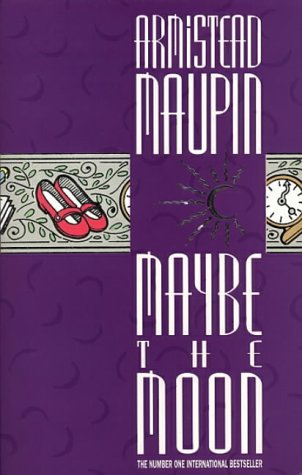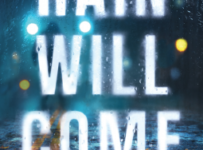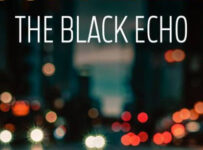
Maybe The Moon is Armistead Maupin's biggest deviation from type in his career. The first non-Tales book he wrote, it's a paean to a departed friend and gives Maupin a chance to reveal a different voice. This voice can be charming, but it eventually gives way to a second hand anger that belongs to an entirely different book. It's hard for me to know what to make of it, even a week later.
Cadence Roth, at 30 years old, stands 31 inches tall and the best years of her acting career are already behind her. Maybe The Moon is presented in the form of a diary documenting her attempts to revitalise her career, find love and reconnect with old friends.
Maybe The Moon is more overtly biographical than the initial Tales of the City sextet, with aspects of several peoples' lives reflected in the story and its characters. Cadence is openly based on Tamara De Treaux, the woman who played E.T. Cadence shot to a certain brand of fame as a not very subtle elf called "Mr Woodsâ€, who taught a suburban child the meaning of being difference, and touched a generation.
This means that the director of "Mr Woodsâ€, Philip Blenheim, is pretty blatantly a stand-in for Steven Spielberg, who famously did not want the "magic†of E.T. To be dispelled by the knowledge of the woman inside the suit. This knowledge is then compromised by the fact that, in the context of the Maybe the Moon universe, Spielberg still exists. Normally one would expect that in such a book Spielberg would either be erased from existence or at least not mentioned, which would be the same thing. That Spielberg is a factor makes one wonder what Maupin's version of the director was doing in 1983. Making Temple of Doom not suck? One can only hope.
Given that Cadence is the host of our voyage, we have to get accustomed to her quite quickly or the book sinks. Maupin has clearly been able to adapt his style to craft a work that is recognisable as his own yet written with a distinct voice for the character. She is not a woman who seems resigned to her fate, but rather one who has come to accept who she is while still allowing herself to feel frustrated about her inability to attain gainful employment. She is a great character, and so is her "dumb†roommate Renee. Maupin is not above mentioning giving some credence to the idea that Renee's perceived ditiziness is symptomatic of Cadence's point of view.
Maupin's strength is that Cady's story is sympathetic, despite the fact that most of the readers are by definition not burnt out dwarf actors, and the romance that she experiences feels real and all too problematic in the exact places that one might expect it. Cady's sense of the world that she lives in and her place in it feels true, if not as lovingly rendered as Maupin's take on his adopted San Francisco.
All of this is when Maupin is being a realistic writer, which eventually gives way to what the blurb describes as a "scheme so hare-brained and daring that it might just succeed…â€, which dovetails awkwardly with the book's other problem.
Maybe the Moon features another Maupin character who has had sex with Rock Hudson. Rather than being gratuitous, it ties in with Maupin's own queer politics, mouthed here through Jeff. Jeff's tribulations are relevant, especially in the wider context of the uneasy points that Maupin makes about the actual place of homosexuality in the acting community, but this is not that story; it's an element, certainly, but not the whole thing. Cady's distance from the issues make them lack the narrative impact that Maupin would have been able to achieve if he had a different character balance.
Jeff's problems are valid, but they don't exactly work and it's hard to pin them down exactly. The likely issue is that Cady merely reports what Jeff says rather than taking a stance on what he says. You get to feel the character's rage, but it has little bearing on what Cady plots for herself. It's a case of a valid message not being expertly incorporated in with the book as a whole. A journal does not have to meet a narrative form, but it does when it's presented in the guise of a novel. While none of the other characters have enough substance to centre a novel around, the Jeff and Callum story could have easily been another book altogether, and would have worked better there. This is Cady's book and she doesn't have room for fully realised relationships between other characters.
Maybe The Moon is a well-written and largely well realised novel but the harsh reality that is presented by the ending after the promised attempt at a "hare-brained scheme†comes as a slap in the face. The book is indeed funny and warm with Maupin's trademark pathos and sadness tinting it, but I was overwhelmed to the point of finding it depressing by the end. Not out of any feelings of condescension, but of the knowledge of Maupin's fundamental truths – truths that sadly aren't significantly different today.
It's not really a surprise that this is his follow up to Sure of You, and that he has maintained some of that book's negative energy, but that he dresses this up in a sort of deliberately disingenuous post-script means that it's harder to swallow.
Something about Maybe the Moon feels inevitable, and there is no sense of escape. It is a celebration of a life, but also a eulogy. It feels more real than <i>Tales</I>, but less <i>right</i>.  Maybe the Moon is consequently a good book but, unlike the rest of Maupin's canon, not one that I'll ever be in a hurry to read again.


